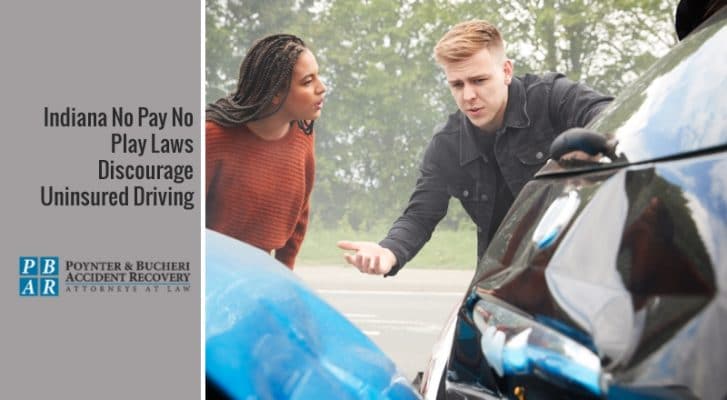
Indiana No Pay No Play Laws Discourage Uninsured Driving

What you’ll learn reading this article:
- Indiana ranks 8th in the number of uninsured motorists, a rising trend across the U.S.
- The cost to insured drivers has climbed 75% over the past 10 years.
- “No Pay, No Play” laws incorporate regulations for uninsured drivers’ ability to sue for damages and their rights to seek compensation regardless of fault.
Across the United States, the number of uninsured motorists is rising – due to financial strain, the rising cost of insurance, other economic factors or motorists simply failing to take note of a policy renewal date – which has many state governments rightfully apprehensive.
Despite being the sixth cheapest U.S. state for car insurance, Indiana ranked eighth in the number of uninsured motorists as recently as 2015, with up to 16.7% of drivers driving without insurance, higher than the national average of 13%.
Because of this trend, the cost to insured drivers has climbed 75% over the past 10 years. States are enacting laws to help reduce the number of uninsured motorists on the road.
Uninsured Drivers Impact Insured Drivers
The odds of getting into an automobile accident in your lifetime are high; in fact, if you are over the age of 34 and haven’t yet been in an accident, you are beating the odds. According to car insurance industry statistics, an individual is likely to file an accident claim once every 17.9 years, meaning in a typical driver’s lifetime, they will be involved in multiple car accidents.
With 32 million drivers or more on the road without insurance, your chances of being in an accident with an uninsured driver are good, which is bad for you. That’s because insured drivers or their insurance companies are often required to pay for the acquired physical damages and health costs of an accident when an uninsured driver is at fault. Or, if the other driver is under-insured, their policy limits may not be high enough to allow for full coverage of the costs.
How Fault Works in Indiana
When it comes to the legal definition of fault, a state can either be a no-fault state or an at-fault, or tort, state. While 12 states in the U.S. are currently no-fault states, Indiana is a tort state, meaning someone must be found at fault in the case of a motor vehicle accident and is then responsible for the damages that result from the accident. This means if you are in an accident with an uninsured driver, even if they are at fault, you and your insurance company are responsible for costs associated with the accident. For this reason, 11 states including Indiana currently have “No Pay, No Play” laws and random insurance verification checks in effect.
No Pay, No Play in Indiana
While the intricacies of “No Pay, No Play” laws differ depending on the state, all incorporate regulations for uninsured drivers’ ability to sue for damages, and all address an uninsured driver’s rights to seek compensation for economic and/or non-economic losses, regardless of fault. The thought behind “No Pay, No Play” is that if you are unwilling to take part in a system (i.e. car insurance), you shouldn’t be able to benefit from or take advantage of it.
Car accidents, whether they are fender-benders or major crashes, are time-consuming, frustrating and expensive. Even seemingly minor accidents can result in a costly trip to the body shop, or even a totaled car, requiring you to rely on a rental. The result from this minor accident is often missed work, and major accidents may require additional costs in terms of medical care.
Indiana’s “No Pay, No Play” laws are made up of statutes Chapters 27-7-5.11 and 34-30-29.2 of the Indiana Code. Essentially, these laws allow insurance companies to avoid paying non-economic damages if the uninsured motorist involved in the accident is a repeat offender. This law seeks to punish habitual guilty parties rather than first-time offenders.
Under this law, insurance companies can avoid paying non-economic damages such as:
- Pain and suffering (both physical and emotional)
- Physical and emotional impairment
- Emotional distress or anguish
- Loss of consortium
- Any other non-pecuniary loss proximately caused by the accident
Uninsured drivers are still able to recover economic damages, however, including costs associated with medical expenses, lost wages, the loss of economic or educational potential due to injury and other financial losses resulting from the accident.
Other Measures to Discourage Uninsured Driving
According to carinsurance.com, if you are caught driving without insurance in Indiana, you may be subject to a fine of up to $1,000, a suspended license and be required to file an SR-22 form.
Poynter & Bucheri Accident Recovery – Indianapolis Personal Injury Attorneys
If you or a loved one has been injured physically or mentally by a person, product or company, you need to know your legal rights. Our personal injury attorneys are experienced with cases like yours and can evaluate what your case may be worth. We will ensure that you are protected and compensated for your injuries and losses. Why pay up to 40% in attorney fees? Our fee is only 25%* and we fight to win your case or you pay no attorney fees at all. Don’t hesitate – one of our experienced attorneys can assist you right away. Call 1-800-265-9881 for a free case review.
